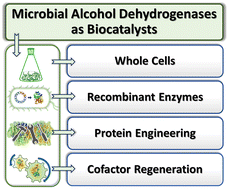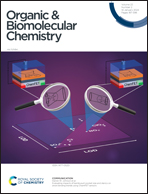Microbial alcohol dehydrogenases: recent developments and applications in asymmetric synthesis
Abstract
Alcohol dehydrogenases are a well-known group of enzymes in the class of oxidoreductases that use electron transfer cofactors such as NAD(P)+/NAD(P)H for oxidation or reduction reactions of alcohols or carbonyl compounds respectively. These enzymes are utilized mainly as purified enzymes and offer some advantages in terms of green chemistry. They are environmentally friendly and a sustainable alternative to traditional chemical synthesis of bulk and fine chemicals. Industry has implemented several whole-cell biocatalytic processes to synthesize pharmaceutically active ingredients by exploring the high selectivity of enzymes. Unlike the whole cell system where cofactor regeneration is well conserved within the cellular environment, purified enzymes require additional cofactors or a cofactor recycling system in the reaction, even though cleaner reactions can be carried out with fewer downstream work-up problems. The challenge of producing purified enzymes in large quantities has been solved in large part by the use of recombinant enzymes. Most importantly, recombinant enzymes find applications in many cascade biotransformations to produce several important chiral precursors. Inevitably, several dehydrogenases were engineered as mere recombinant enzymes could not meet the industrial requirements for substrate and stereoselectivity. In recent years, a significant number of engineered alcohol dehydrogenases have been employed in asymmetric synthesis in industry. In a parallel development, several enzymatic and non-enzymatic methods have been established for regenerating expensive cofactors (NAD+/NADP+) to make the overall enzymatic process more efficient and economically viable. In this review article, recent developments and applications of microbial alcohol dehydrogenases are summarized by emphasizing notable examples.



 Please wait while we load your content...
Please wait while we load your content...